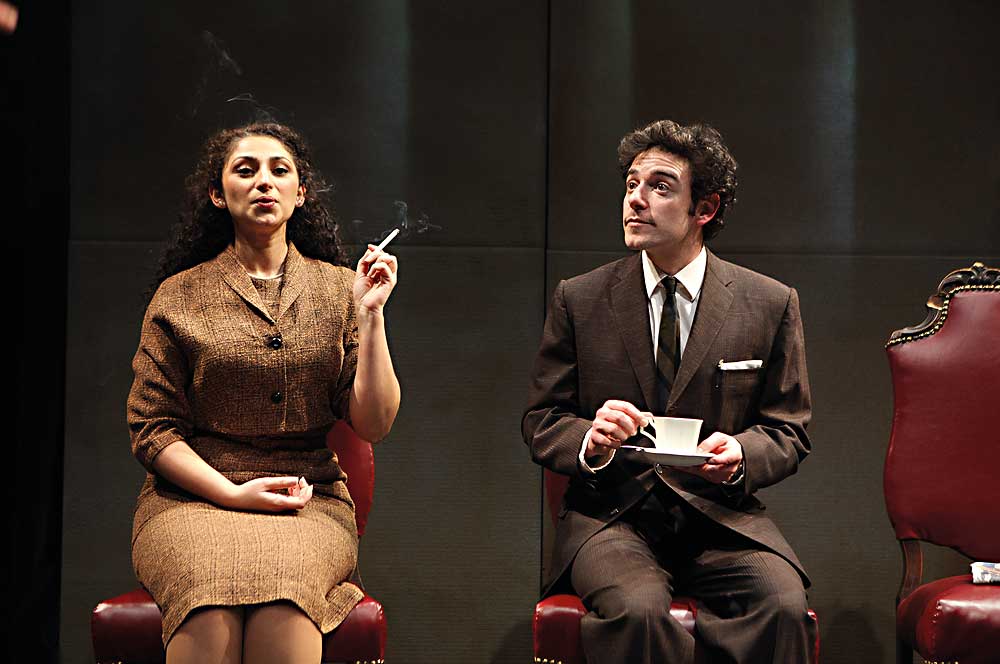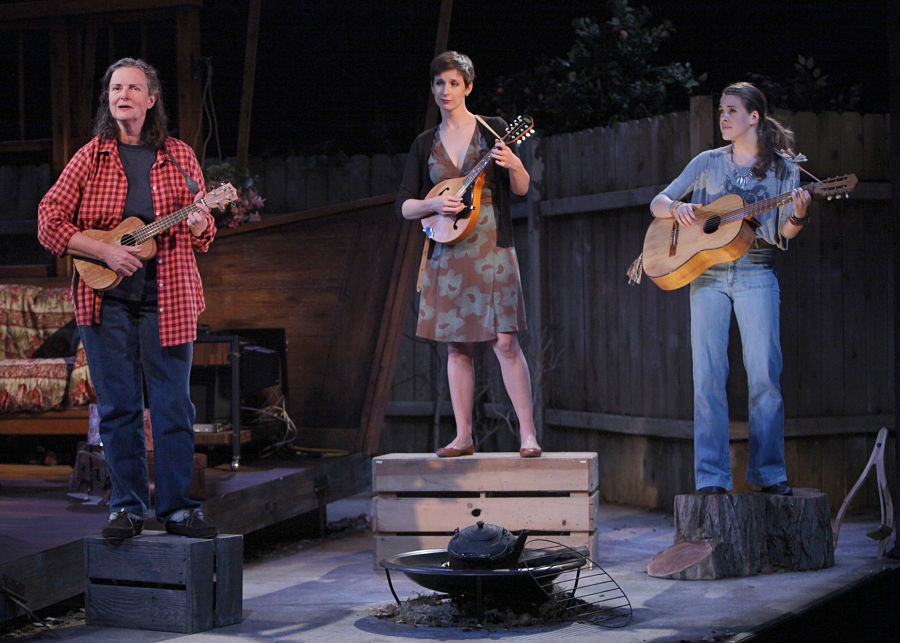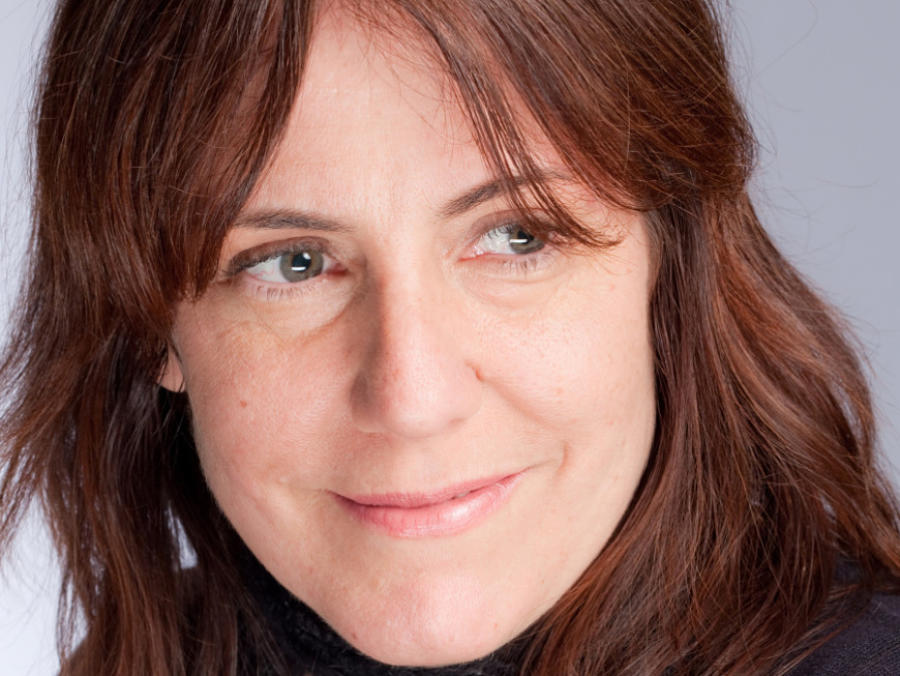Mona Mansour’s work catches you unawares.
In her play Urge for Going—which received a 2011 Public Theater LAB production in New York City under Hal Brooks’s direction, and will have its West Coast premiere Nov. 14–Dec. 8 presented by Golden Thread Productions at Z Space in San Francisco, with Evren Odcikin at the helm—the conflicts within a family of Palestinian refugees in Lebanon rise and fall in ways that leave you breathless.
In The Hour of Feeling—which received its premiere in the 2012 Humana Festival of New American Plays at Actors Theatre of Louisville under Mark Wing-Davey’s direction—the complex call to return to his homeland becomes the focal point of a story of a man at a crossroads in his life.
This season Mansour’s tragicomic family play The Way West debuts at Steppenwolf Theatre Company in Chicago under Amy Morton’s direction (April 3–June 8), and audiences unfamiliar with her work will undoubtedly be charmed and moved by her piquant and incisive writing voice. What distinguishes Mansour’s work is its depth of feeling, its compassion for the thorny and entwined nature of family, identity and politics—and a delicate way with comedy that she’s been honing since an early-career stint writing and performing with L.A.’s famed Groundlings troupe in the 1990s.

The recipient of a 2012 Whiting Award, Mansour has continued to incubate new plays: The Vagrant was developed at the 2013 Sundance Theatre Lab, and she was in residence this summer at Berkeley Repertory Theatre’s Ground Floor development series with The Wife, cowritten with her frequent collaborator Tala Manassah. Since 2011 she has also been collaborating with New York University’s Continuum Company and playwrights Mia Barron and Carson Kreitzer on the provisionally titled Natalya Project, about the murders of a Russian journalist and a Chechen human rights worker.
Mansour and I conversed by e-mail this past April.
CARIDAD SVICH: Writing for the theatre, by its very nature, is political. Once you put something onstage in front of or amongst others, you are engaging in a dialogue with the world. Yet, sometimes the word “political” throws people off. Why do you think that is?
MONA MANSOUR: To say as a writer that you want to focus on topics other people see as “political” is in itself a political decision. But to say that you are going to eschew those topics and focus solely on aesthetics is also a political decision. It’s a question of semantics, yes? For me, politics are, as Mourid Barghouti says in his beautiful memoir I Saw Ramallah, “the family at breakfast. Who is there? Who is absent and why?” To add to this, politics are also a question of who’s in the (metaphorical) room—who is allowed in? What’s stopping those who aren’t? For me, political questions are intrinsically human. I don’t see “politics” as some separate thing.
You have a Lebanese background, and certainly Urge for Going has almost the feeling of memoir about it. How did this play and its prequel, The Hour of Feeling, come about?
Urge for Going was the result of me sitting down for the first time and writing about my father’s homeland. He isn’t Palestinian; but near his village are two camps, and I was always aware of the camps’ existence. In the late 1970s when the Lebanese Civil War got worse, my cousins came to California to live with us, and it was all brought very close. Without going into a whole political rundown about Lebanon, I’ll at least say that these camps were created in 1948. Temporary camps. And here we are, 60 years later, and the situation has really not gotten better. I was struck by how Chekhovian this existence could be—people longing to return home, just across the border, and in this endless state of waiting. Through all that a family came to me, and, yes, much of my own family and extended family got funneled into those two plays. Don’t we all do that in one way or another?

Urge for Going takes place in 2003, in a camp in Southern Lebanon—a father who once had been a star academic, his son and daughter, his wife, brother and brother-in-law, all in one room. I wrote The Hour of Feeling second, wanting to explore one segment of the father’s life—his trip to London in 1967 where he delivers a paper on Wordsworth. In Urge for Going, you hear a bit about the poem “Tintern Abbey,” and in The Hour of Feeling, you see young Adham and his wife Abir go from 1967 Palestine to London. It’s his finest hour. And at the end he has to decide whether or not to go home (and into war, essentially).
The newest play in this trilogy is called The Vagrant. It’s not done yet. It poses the question: What if Adham stays in England after 1967? What does his life look like? So Urge for Going is his life if he goes back to the Middle East, and The Vagrant is if he doesn’t; neither route is a “winning” one. Both involve heartbreak.
The Way West, which you workshopped at the Lark Play Development Center in New York, shows a very different side of your writing voice. For one, it’s a California play, and I know you grew up in SoCal, but it’s also hyperreal in a way. How are you building your body of work? Is there for you a clear path?
Ha! No clear path! I often say The Way West is my mother’s play—it’s her worldview, her West Coast American ethos, which is part of my life. Now I want you to answer. How do you build your body of work? Is it intuitive, or has there been some planning it out?
Building a body of work for me has been mostly about chasing what inspires me, rather than as a result of meticulous planning, although I do tend to write serially around themes or conceptual ideas. Did you start writing for live performance as a result of your training as an actor?
I am a better actor now than I ever was when I was an actor. I like writing or creating moments that are things I can feel, but that I know I couldn’t quite do when I was acting. They were above my reach.
How did the piece you started working on at the NYU grad acting program—the one about journalist Anna Politkovskaya—come about?
At the helm are Jim Calder, who’s taught movement at NYU for years, and Eliza Baldi, who is shaping that play. It’s comprised of different pieces of writing by the actresses who have worked on it, as well as writing done by me, Mia Barron and Carson Kreitzer. We’ve all been in communication again lately because we’re trying to get another round of working on it—and also because Anna was very critical of Putin, and was covering the conflict in Chechnya, which is now more topical than ever. Her source in Chechnya was a human-rights worker named Natalya Estemirova—Anna stayed with her when she went to Grozny. And the two women were both assassinated.

Writing doesn’t come from staying in a safe place—good writing, anyway. You have to stick your neck out, go on the ledge (whatever that means for you), get out of the comfort zone, and see what is really driving a piece into being. How do you navigate fear and vulnerability in your process?
I’m almost always uncomfortable in some way or other. Getting out of my comfort zone is an easy commute.
I have written many plays that revolve around issues of displacement and what it does to the psyche—it’s been central to a lot of my work, in part because there are histories of displacement in my family. Borders upon borders traversed. What is your lens on displacement as a writer?
“Borders upon borders traversed,” that’s really lovely. Yes, I am always thinking about this. What is lost when you leave a place? What are you forced to give up? I think in the case of my Middle East plays, the Palestinian narrative is so heightened because it asks, “What does that heartbreak look like when you aren’t allowed to go back?”
Do you think a play can ever transcend questions of identity?
Of course! We all hope for that, right? I had a woman come up to me the first time The Hour of Feeling was read, and she told me that Adham’s “decision” to not go back to Palestine affected her deeply because she’d made that same decision about Eritrea years ago. A split-second decision that’s impossible to make, and one you have to live with the rest of your life.
Multilingualism in playwriting is an issue that affects us all (as was clear in Diep Tran’s article on multilingual theatre in AT Feb. ’13, for which we were both interviewed). It obviously affects casting as well as the actual writing—what words to use when? How much needs to be explained to an audience? Some folks might say, in that very parochial way, keep it English-only, y’know?
I can’t address the “keep it English” thing. It seems so not in touch with what’s happening. A girl in China can do a fashion blog, and if the fates line up, Vogue or Teen Vogue or whoever’s readers can find out about her, and suddenly she has a say in the zeitgeist. Given that access, how can we limit how many languages are spoken in a play? Beyond that, of course, there is no such thing as one American English anyway. But you know that!
Are there little rituals in your writing life that you cherish or sustain to keep yourself going?
I have to think about that. I like doing research. I find it very grounding.
Caridad Svich received Arizona Theatre Company’s 2013 National Latino Playwriting Award for her play Spark, and a 2012 Obie Award for lifetime achievement.


